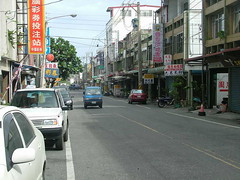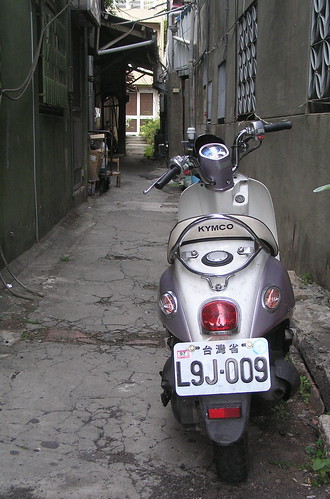Francis Fukuyama has some interesting propositions about the desire for
modernity, market economies, and liberal democracies on Project Syndicate. He's mainly concerned about the mess in Iraq, but let's see how they would work with Taiwan and China.
Fifteen years ago in my book The End of History and the Last Man I argued that, if a society wanted to be modern, there was no alternative to a market economy and a democratic political system. Not everyone wanted to be modern, of course, and not everyone could put in place the institutions and policies necessary to make democracy and capitalism work, but no alternative system would yield better results.
Unlike the Arab world where the project of modernity is still questioned, both Taiwan and China want to be modern. But let's turn Fukuyama's propositions around in the second sentence and consider them one by one.
There is a broad intellectual consensus among Taiwan's elites that democracy and capitalism yield the best results in the pursuit of modernity. Now I think it is possible to argue that one can find a substantial number of voters among Taiwan's increasingly disaffected traditional middle class (teachers, civil servants, and soldiers) who long for the good old days under Chiang Ching-kuo when Taiwan had (statist) capitalism but not democracy. But I submit that the KMT leadership, and even the PFP leadership, however reluctantly, accepts the efficacy of democracy and capitalism even when they pander to undemocratic sentiments among some members of the middle class.
But the situation in China is very different. While a brand of state-directed capitalism that would look familiar to Chiang Ching-kuo is accepted as being more efficient than socialism, outside of a few intellectuals, few accept that democracy has a role to play in China's rise to modernity. Indeed many argue that democracy would in fact hinder that rise by unleashing political instability.
Perhaps the more significant question is whether Taiwan and China are capable of putting the policies and institutions in place that underpin democracy and capitalism. In Taiwan, of course, the answer is broadly yes. Taiwan has a functioning private property system, free elections, an independent judiciary, and securities markets that work as they should to raise capital for private enterprise.
China, however, is engaged in an epic struggle. It does not have secure private property rights, not does it have functioning securities markets. Much as the kleptocrats who govern China see democracy as a hindrance to modernity, they correctly see private property as a potential obstacle to the orgy of development that is probably the main force driving China's incredible boom. Securities markets, which barely functioned until recently, are mainly just a method by which the Chinese people are divested of their savings by the state. An independent judiciary--the linchpin of both democracy and capitalism--is in its infancy. As for democratic institutions, there is not much point discussing them since there is no agreement in China that they are necessary or desirable.
To be sure, the desire to live in a modern society and to be free of tyranny is universal, or nearly so. This is demonstrated by the efforts of millions of people each year to move from the developing to the developed world, where they hope to find the political stability, job opportunities, health care, and education that they lack at home.
And it has been demonstrated in Taiwan by the democracy movement, and by immigration from and within China. Both the Taiwanese and the Chinese want live in modern societies and be free of tyranny.
But this is different from saying that there is a universal desire to live in a liberal society – that is, a political order characterized by a sphere of individual rights and the rule of law. The desire to live in a liberal democracy is, indeed, something acquired over time, often as a byproduct of successful modernization.
Here Fukuyama hits the heart of the matter. The Chinese do not want to live in a liberal society (yet) while the Taiwanese increasingly do. And as Fukuyama argues, the increasing Taiwanese desire to live in a liberal democracy is something that the Taiwanese have acquired over time as a byproduct of successful modernization.
It is a truism in discussions of Taiwanese politics to say that other than identity there is little that divides the greens and the blues. While this is certainly true in terms of say, economic policy, there is also a real divide in terms of commitment to living in a liberal democracy. The DPP is unquestionable committed to liberal democracy while the KMT is a bizarre hybrid between those who espouse a version of Chinese nationalism that is incompatible with liberal democracy and an illiberal wing of the Taiwanese elite (think Wang Jin-pyng) who want to live in a state committed to full scale development, not a liberal democracy.
Moreover, the desire to live in a modern liberal democracy does not translate necessarily into an ability to actually do so.
I see this as the last hurdle for the Taiwanese to get over before they can finally reach their ultimate goal of becoming a modern liberal democracy--that is, if China doesn't rain missiles down on Taiwan first. I am certainly not saying that the Taiwanese innately lack this ability, just that not everyone in Taiwan has learned these skills and become habituated to this culture.
Outside powers like the US can often help in this process by the example they set as politically and economically successful societies. They can also provide funding, advice, technical assistance, and yes, occasionally military force to help the process along.
One example of using military force legitimately 'to help the process along' would be to defend to Taiwan in the event of a Chinese attack.
Labels: capitalism, China, democracy, Francis Fukuyama, history, modernity, Taiwan

















